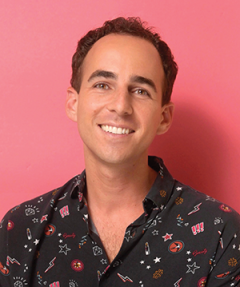Jeffrey Masters '11 shares insights about the recent slew of bills that have been passed or proposed in the U.S. targeting the trans community.

After former North Carolina Gov. Pat McCrory signed HB2, The Public Facilities Privacy and Security Act, into law in 2016, the blowback was fierce. Commonly known as “The Bathroom Bill,” the law required trans people to use public bathrooms corresponding to the sex listed on their birth certificates. It also amended state law to prohibit cities and local governments from passing anti-discrimination protections for LGBTQ+ people.
Ringo Starr and Bruce Springsteen canceled concerts as a result. The NAACP initiated a national economic boycott. Production companies moved TV and film shoots to other states. Companies like Adidas and PayPal canceled major office expansions. States issued travel bans for government employees. And most notably — this is basketball country, after all — the NCAA moved the men’s basketball tournament out of North Carolina. Before the bill was repealed, the Associated Press estimated that it would cost the state $3.76 billion over the course of 12 years.
In an organized effort, anti-trans bills are being copied state-by-state, then introduced in multiple state houses with sometimes identical text.
Eight years ago, North Carolina was something of an outlier in passing an anti-trans bill. Today, over half the states in the U.S. have passed or proposed bills targeting the trans community. According to the American Civil Liberties Union, there have been 527 bills this year so far, bills that have banned trans kids from sports, from accessing health care, from amending their birth certificates. One Florida policy says that anyone found to be “misrepresenting” their gender on their driver’s license can be found guilty of fraud and criminally prosecuted.
But unlike in 2016, a backlash has been almost nonexistent. It’s comparatively harder for a business or sports team to boycott multiple states. In an organized effort, anti-trans bills are being copied state-by-state, then introduced in multiple state houses with sometimes identical text. Politicians have learned that this is a winning issue, something that can be introduced piecemeal to keep returning to the same issues year after year. It’s been exhausting for trans people who live in these states, and the sheer number has proven too overwhelming for national groups to effectively organize around.
A politician or corporation that speaks out against anti-trans bills today is often met with an outpouring of hate. Think about how conservatives responded when Dylan Mulvaney, a trans influencer, unveiled a small partnership with Bud Light. Fans boycotted the beer so successfully that Modelo overtook Bud Light as the U.S.’s top-selling beer, a title they continue to hold today. Bud Light infuriated conservatives by its perceived support of a trans person, while a series of tepid statements about the controversy also angered those on the left. No one was happy and Bud Light’s parent company, Anheuser-Busch, lost an estimated $1.4 billion in sales.
While these bills have created a tremendous amount of harm — nearly half of trans people in the U.S. are reportedly considering moving to a new state — there have been real victories. Recently in Florida, a portion of the “Don’t Say Gay” law was struck down, making it legal once again for kids and teachers to discuss gender and sexuality. A federal judge also ruled that a Florida law blocking gender-affirming care for both trans kids and trans adults was unconstitutional.
We’re actively experiencing the push-pull of progress: Later this year, Delaware State Sen. Sarah McBride is seeking to make history by becoming the first out trans person elected to the United States Congress. At the same time, a number of candidates across the country are running on explicitly, proudly anti-trans platforms. If they win, the trans community can expect to see their rights continued to be whittled away. A great number of lives, young and old, are at risk, and as the overturning of Roe v. Wade made painfully clear, there is no guarantee that the progress we’ve made in recent years will last forever.
Jeffrey Masters ’11 is the senior producer of The New Yorker Radio Hour and the host/creator of the podcast LGBTQ&A, which has featured interviews with over 250 LGBTQ+ people, including Laverne Cox, Pete Buttigieg, Melissa Etheridge and Angela Davis.


